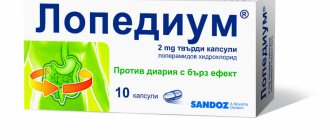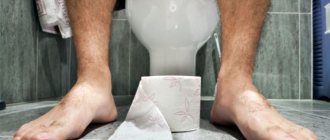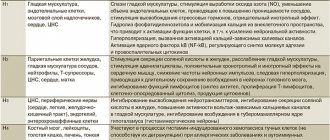The best drugs for diarrhea.
September 21, 2021
1454
5
1
Content
- Causes of diarrhea
- Types of diarrhea
- 8 effective remedies for diarrhea
- Imodium Express
- Loperamide
- Smecta
- Sulgin Avexima
- Enterofuril
- Polysorb MP
- Linex
- Furazolidone
No one is immune from diarrhea: children, adults and the elderly. The main danger of diarrhea is dehydration, although it is considered a protective reaction of the body. Let's look at the causes and types of this condition, and also consider the most effective drugs for treating diarrhea. Read also The most effective probiotics for the intestines: top 5 How to choose a probiotic and for what problems it is prescribed.
Causes of diarrhea
Diarrhea is when the stool becomes loose or watery instead of normal. This phenomenon occurs frequently and usually goes away on its own within a few hours without treatment. It is impossible to identify the cause of rapidly passing diarrhea.
If diarrhea lasts longer than one day, we can talk about viral gastroenteritis, when the intestines are infected by a certain virus. This condition is also called intestinal flu. Other possible causes of diarrhea include:
- bacterial infection;
- poisoning of the body with waste products of bacteria (toxins);
- consumption of foods that disrupt the gastrointestinal tract;
- intolerance to some foods (celiac disease, lactose intolerance) or allergies;
- taking certain medications;
- radiation therapy;
- dyspepsia (problems with absorption of food).
There are several important criteria
things to look out for when it comes to diarrhea.
- Causes of diarrhea.
This is the main point. If the cause of diarrhea is an infection, the body thus tries to remove toxins, which (the waste products of bacteria). Conventional strengthening drugs will only worsen the patient’s well-being, increasing intoxication. Infectious diarrhea requires antibiotics. - Patient's age.
If a child has diarrhea, then he needs medications in the form of syrup, drops or lozenges. Children have a poorly developed muscle layer and a narrow esophagus, so there is a risk of regular tablets getting into the respiratory tract. And many tablet drugs are contraindicated for children.
Causes and treatment of diarrheaPhotos from open sources
Read also:
Top 5 best sorbents for poisoning Rating of the most effective and safe sorbents that help with poisoning and hangover syndrome.
Types of diarrhea
Diarrhea can be acute or chronic. Acute usually occurs due to infection and lasts no longer than two weeks. Among the causes of chronic diarrhea are irritable bowel syndrome, dietary habits, or a certain psycho-emotional state of a person.
- Infectious diarrhea.
This condition is caused by both viruses (for example, rotavirus), bacteria (E. coli, salmonella, etc.) or protozoa. Infectious diarrhea often causes fever, abdominal pain, nausea, vomiting, and deterioration in general health. You can often tell by looking at the stool which pathogen is present in the body. Greenish stool color is most likely salmonellosis, “raspberry jelly” stool is amoebic dysentery, etc. Usually, infectious diarrhea can be cured on your own. But if the condition only worsens, you need to consult a doctor. - Non-infectious diarrhea.
With such diarrhea there is usually no fever or abdominal pain. Non-infectious diarrhea is caused by stress, antibiotics, poor lifestyle and bad habits, vegetative-vascular dystonia, problems with the pancreas and diabetes. By the way, for diarrhea during antibiotic treatment, many doctors prescribe probiotics, but in fact, it is enough to simply consume more fermented milk products. Treatment for non-infectious diarrhea is to take pills that reduce bowel activity. Treatment with herbal remedies is also possible (gastrointestinal herbs, rose hips, oak bark, chamomile, etc.). It is important to normalize your lifestyle and try to be less nervous.
Since diarrhea removes a lot of fluid from the body, it is important to replenish it. And it’s better to drink rehydration solutions rather than water. If there is no appetite due to diarrhea, there is no need to eat (or force the child). If you have a normal appetite, it is better to follow a diet while you are treating diarrhea: liquid mashed potatoes, stewed vegetables, rice, light soups.
Read also How to treat dehydration: 5 solutions for rehydration What drugs for dehydration are most often prescribed by doctors?
What to take for diarrhea?
For diarrhea, take medications from various drug groups. It all depends on what exact cause is underlying the bowel dysfunction.
Types of medications that can be used to treat diarrhea:
- Preparations with an adsorbing effect: activated carbon, Polyphepan, Polysorb.
- Preparations with an astringent effect: bismuth nitrate.
- Starch has enveloping properties.
- Medicines that help normalize the intestinal microflora: Acipol, Bifiform, Hilak Forte.
- Antidiarrheal drugs: Loperamide, Imodium, Smecta.
- Drugs with an antiseptic effect: Enterofuril, Furazolidone.
- Drugs to stop diarrhea by slowing intestinal motility: Atropine.
Content:
If a patient is diagnosed with infectious diarrhea, which was provoked by bacterial flora, then he is advised to take intestinal antiseptics. For diarrhea caused by irritable bowel syndrome, you should take medications designed to reduce bowel movements. Often, the doctor simultaneously prescribes drugs from several drug groups, for example, adsorbents, probiotics and bismuth preparations.
| Cause of diarrhea | Group of drugs | Name of the drug |
| Bacterial nature of diarrhea | To destroy bacterial intestinal flora, intestinal antiseptics are required. Adsorbents are prescribed to remove toxins from the body. To prevent the development of dysbiosis, probiotics are prescribed. To prevent dehydration, rehydration therapy is necessary. |
|
| Viral and parasitic nature of diarrhea | Adsorbents are prescribed to remove toxins from the body. Probiotics are prescribed to restore intestinal flora. To stop severe diarrhea, accompanied by signs of dehydration, intestinal secretion inhibitors are prescribed. At the same time, rehydration therapy is carried out. |
|
| Diarrhea of non-infectious origin | To reduce the permeability of the intestinal wall, drugs that have an astringent effect are prescribed. | Enveloping and astringent preparations: Almagel, Neointestopan, Tannacomp. |
| Diarrhea due to irritable bowel syndrome | To stop severe diarrhea, antidiarrheal drugs of synthetic origin are used. To reduce the activity of intestinal motility, plant-based antidiarrheal drugs, as well as tricyclic antidepressants, are prescribed. |
|
| Diarrhea due to dysbacteriosis after taking antibacterial drugs | To stop diarrhea, drugs are used to normalize the intestinal flora. | Probiotics: Enterol, Linex, Bifidumbacterin, Lactulose, Colibacterin, Acylact, Bifiform. |
Sometimes, to get rid of diarrhea, it is enough to simply stop eating a certain food. Thus, dairy products should be excluded if you have lactase deficiency. If you are diagnosed with celiac disease, you need to avoid foods that contain gluten. People diagnosed with phenylketonuria should not eat all foods containing phenylalanine.
Imodium Express
For non-infectious diarrhea, Imodium Express is often prescribed, the active ingredient of which is loperamide. The drug has a strengthening effect and can be prescribed in the complex treatment of infectious diarrhea. You can buy Imodium in the form of lozenges - to make the drug work faster, the tablet can be placed under the tongue. So if diarrhea has started acutely and you need emergency help, pay attention to Imodium Express.
Imodium Express
Catalent UK Swindon Zaidis Limited / Janssen-Cilag S, UK / Italy
The anti-diarrhea remedy Imodium Express dissolves on the tongue in just 3 seconds, does not require drinking water and has a pleasant mint taste.
Imodium helps stop diarrhea from the first use: the proven formula of tablets for diarrhea (diarrhea) slows down the time it takes for contents to pass through the intestines. Imodium helps preserve the natural intestinal microflora, preventing it from being washed out during diarrhea. from 143
5.0 1 review
21
- Like
- Write a review
Loperamide
In its action, Loperamide is identical to Imodium; it is also prescribed for functional intestinal disorders, when the cause of diarrhea is not an infection. But Loperamide, like other oral tablets, begins to act within 20 minutes. If you need a faster effect, it is better to choose “Loperamide” in capsules (there is powder inside, and the capsule itself is gelatin).
Loperamide
Grindeks, Latvia; OJSC "Nizhpharm", Russia; Biocom, Russia; Ozon LLC, Russia; Update, Russia; Veropharm / Lance-Pharm, Russia; JSC "Lekhim-Kharkov", Ukraine; Pharmacor Production LLC, Russia
Symptomatic treatment of acute and chronic diarrhea of various origins (allergic, emotional, medicinal, radiation; with changes in diet and quality of food, with metabolic and absorption disorders; as an adjuvant for diarrhea of infectious origin).
Regulation of bowel movements in patients with ileostomy. from 7
5.0 1 review
883
- Like
- Write a review
Symptoms of dysbiosis
There are no strict symptoms that most likely indicate dysbiosis. Manifestations of pathology often do not correspond to the severity of the disorders. The most common symptom is indigestion such as intestinal dyspepsia. It manifests itself with the following symptoms:
- rumbling in the stomach;
- flatulence, increased gas formation;
- bloating;
- stool disorders;
- the appearance of pathological impurities in the stool.
Increased gas formation at the initial stage occurs after a nutritional disorder. If on a certain day the diet included milk, legumes, a large amount of flour and sweets, the symptoms appear clearly.
Stool disorders are variable. Most often, dysbiosis manifests itself as diarrhea. It may be accompanied by cramps and abdominal pain. Sometimes unformed stool appears only once a day, so it does not meet the criterion of diarrhea.
Diarrhea may alternate with constipation. This process is observed in people who limit the amount of fiber and dietary fiber in their diet. This deprives the bacteria of essential nutrients and prevents them from retaining water in the intestinal lumen. Mucous pathological impurities in the stool and abdominal pain appear with advanced forms of dysbacteriosis.
Violation of the microflora composition leads to vitamin deficiency. If it is not compensated by nutrition or taking multivitamin preparations, symptoms of hypovitaminosis appear:
- the condition of hair and nails worsens;
- rashes appear on the skin;
- allergic reactions or food intolerance appear;
- fatigue increases, performance decreases;
- sleep is disturbed.
Intestinal microorganisms synthesize vitamin K, which is involved in blood clotting. With hypovitaminosis, the appearance of bruises and hematomas under the skin from slight mechanical impact becomes more frequent. With a stomach ulcer or minor injuries, the risk of prolonged bleeding increases.
In severe cases, dysbiosis, which is accompanied by diarrhea, leads to dehydration. Many patients experience weight loss.
Smecta
This anti-diarrhea drug is an enterosorbent. “Smecta” is sold in sachets, in the form of a powder that needs to be dissolved in water. If a child has diarrhea, you can buy Smecta with some flavor, which will make it easier for the baby to take. Prescribed remedy for heartburn, bloating and diarrhea. The medicine has virtually no side effects or contraindications.
Smecta
IPSEN (Bofur Ipsen), Ukraine
Symptomatic treatment of pain associated with diseases of the esophagus, stomach, duodenum;
intestinal colic; acute and chronic diarrhea (especially in children). from 123
3.0 3 reviews
1047
- Like
- Write a review
Sulgin Avexima
This is one of the most frequently prescribed remedies for infectious diarrhea, which has long been present on the Russian market. "Sulgin Avexima" perfectly suppresses the proliferation of pathogenic microflora. However, doctors do not recommend taking this drug for a long time, since it interferes with the absorption of vitamins and nutrients in the intestines. After a short course of treatment with this drug, it is recommended to take a vitamin complex. You can buy Sulgin Avexima with a prescription and only on the recommendation of a doctor.
Sulgin Avexima
JSC Avexima, Russia
Sulgin Avexima is an antimicrobial bacteriostatic agent.
The mechanism of action is due to antagonism with para-aminobenzoic acid (PABA) and competitive inhibition of dihydropteroate synthetase, which leads to disruption of the synthesis of tetrahydrofolic acid, necessary for the synthesis of purines and pyrimidines. Inhibits the growth of Escherichia coli and reduces the synthesis of thiamine, riboflavin, and nicotinic acid in the intestines. SULGIN has a bacteriostatic effect on Streptococcus spp., Staphylococcus spp., Escherichia coli, Shigella dysenteriae, Proteus vulgaris. from 52
328
- Like
- Write a review
What is dysbiosis
A child is born sterile; there are normally no bacteria in his body. The intestines and skin are colonized gradually, starting from the first attachment of the baby to the breast. The older the child gets and the more varied his food, the more different bacteria enter the intestines and form its microflora. In adults, the composition of microorganisms stabilizes, but becomes diverse. It can be compared to a fingerprint; despite the similarities, it is not repeated in any person.
Among intestinal bacteria, there are hundreds of types of good microorganisms, but normally there are also bad ones, the growth of which the body can restrain. There are three types of microbes:
- dominant - present in all healthy people, these include eubacteria, bacteroides, bifidobacteria, lactobacilli;
- non-permanent species - not found in everyone or under certain conditions, these are streptococci, Escherichia coli, Proteus, Cytobacter;
- transient species - sometimes enter the intestines, but do not stay there for a long time; these are types such as yeast fungi, clostridia, and Pseudomonas aeruginosa.
Good microorganisms are the dominant bacteria, they should be the majority. Thanks to the presence of normal microflora, food is digested. Bacteria help ferment some indigestible foods and participate in the absorption of vitamins, amino acids, and sugars. They themselves also synthesize vitamins B, K, and fatty acids. Therefore, with dysbacteriosis, signs of hypovitaminosis appear.
Good bacteria act as human shields. They form a protective layer on the intestinal wall, which does not allow pathogenic microorganisms to attach and limits their supply of nutrients. The immune function is to train immune cells and regulate its response to the penetration of foreign microorganisms or proteins.
But with a change in the ratio of bacteria, an increase in the number of transient species, and the appearance of yeast fungi, dysbacteriosis develops. It cannot be called a disease, but a person’s well-being is impaired. With dysbacteriosis, there are no pathogenic microorganisms in the intestines (Salmonella, Vibrio cholerae, Yersinia, pathogenic Escherichia, as well as viruses). Changes in composition occur due to an imbalance of normal flora and an increase in the concentration of opportunistic bacteria and the appearance of fungi.
Enterofuril
This antidiarrheal drug has a wide spectrum of action. Unlike other antimicrobial agents, Enterofuril does not suppress the beneficial intestinal microflora, but even restores it. The drug is sold in the form of a suspension, which is not absorbed into the blood, but works in the lumen of the gastrointestinal tract, destroying the infection. That is why the medicine has minimal side effects. And do not be afraid of the rich shade of the drug - this is not a dye, but the natural color of the active substance - nifuroxazide.
Enterofuril
Bosnalek, Bosnia and Herzegovina
Enterofuril is a broad-spectrum antimicrobial agent, a derivative of 5-nitrofuran.
Active against gram-positive microorganisms (Streptococcus aureus, Staphylococcus pyogenes, Clostridium), gram-negative enterobacteria - E. coli, Salmonella spp., Shigella spp., Klebsiella spp., Enterobacter spp., Vibrio cholerae, Campylobacter jejuni, Edwarsieila, Citrobacter, Yersinia enterocolitica . from 212
5.0 10 reviews
1818
- Like
- Write a review
Polysorb MP
The anti-diarrhea drug “Polysorb MP” is an enterosorbent that binds to toxins in the gastrointestinal tract and helps them exit the body. Such products are distinguished by the fact that they are not absorbed into the blood, so they practically do not cause “side effects”. Allergic reactions and disruption of the synthesis of vitamins in the gastrointestinal tract are only sometimes possible (and only if the drug is taken for more than two weeks). You can buy Polysorb MP in the form of a powder that is diluted in water. "Polysorb MP" for diarrhea can be taken by children, pregnant and lactating women, as well as the elderly.
Polysorb MP
CJSC "Polysorb", Russia
Acute and chronic intoxication of various etiologies in children and adults;
— acute intestinal infections of various etiologies, including foodborne toxic infections, as well as diarrheal syndrome of non-infectious origin, dysbacteriosis (as part of complex therapy); - purulent-septic diseases accompanied by severe intoxication; - acute poisoning with potent and toxic substances, incl. medications and alcohol, alkaloids, salts of heavy metals; — food and drug allergies; - hyperbilirubinemia (viral hepatitis and other jaundices) and hyperazotemia (chronic renal failure); - residents of environmentally unfavorable regions and workers of hazardous industries for the purpose of prevention. from 45
5.0 1 review
777
- Like
- Write a review
Effective drugs for diarrhea
Smecta
Smecta is a natural drug that has an adsorbing effect. It quickly, effectively and safely removes toxic substances, viruses and bacteria from the intestines. At the same time, the work of the organ itself is not disrupted.
The drug is available in powder form; before taking it, it is dissolved in water. The duration of treatment should not exceed 7 days. In case of overdose, constipation develops.
Pros:
- High adsorbing properties;
- Ease of use;
- Pleasant taste;
- Possibility of treatment in childhood;
- Effective for diarrhea of almost any origin;
- In addition to stopping diarrhea, Smecta helps eliminate other unpleasant symptoms, such as heartburn and abdominal pain.
Minuses:
- Relatively high price of the drug;
- The likelihood of skin rashes, especially in childhood.
Smecta's price is about 170 rubles.
Imodium
Imodium is an imported drug with the same main active ingredient as the domestic Loperamide. In addition, the composition of the drug is supplemented with aspartame, gelatin and sodium bicarbonate. Imodium has a pleasant minty taste and is available in the form of lozenges.
The drug is prescribed for diarrhea, which is of non-infectious origin. It is convenient to use when traveling, when stool becomes thinner and more frequent due to climate change. You should not take more than 4 tablets per day.
Pros:
- Convenient release form;
- Pleasant taste;
- Quick effect.
Minuses:
- High price;
- Presence of contraindications and side effects.
The price of Imodium is from 200 to 500 rubles.
Nifuroxazide
Nifuroxazide is a drug from the group of intestinal antibiotics. It has a pronounced antibacterial effect, allowing you to fight most representatives of pathogenic flora.
After oral administration, the drug quickly penetrates tissues and organs, which ensures its high effectiveness in the fight against diarrhea of infectious origin. In this case, the drug acts exclusively on pathogenic flora, while the intestinal bacterial biocenosis remains intact.
The duration of the course of treatment is 7 days. The drug should be taken at certain time intervals, 4 times a day. The average daily dose is 800 mg, but no more.
If treatment is required in childhood, then the dosage form should be chosen in the form of a suspension.
It is strictly forbidden to drink alcohol while taking the medicine.
Pros:
- Powerful antibacterial effect;
- Quick help for diarrhea of bacterial origin;
- Targeted action on pathogenic flora while preserving “good” bacteria in the intestines;
- High bioavailability;
- Possibility of use in childhood;
- Availability of several forms of release;
- There are no side effects and the drug is well tolerated by most patients.
Minuses:
- Relatively high price of the drug;
- Attachment to time intervals during treatment.
Preparations based on the same active ingredient: Ecofuril, Enterofuril, Mirofuril, Nifural, Stopdiar, Elyufor.
Nifuroxazide price – 300-400 rubles.
Enterosgel
Enterosgel is an enterosorbing drug that can be effectively used for various forms of diarrhea, regardless of the cause of the intestinal disorder. The drug is available in the form of a paste, which has a slightly sweet taste.
Enterosgel is prescribed for food poisoning, poisoning by toxic substances, chemicals, poisons, and bacterial and viral diarrhea.
Enterosgel does not affect the absorption of vitamins and microelements in the intestine. Unlike other sorbents, the drug helps restore intestinal microflora, so it can be used for diarrhea due to dysbacteriosis. Enterosgel is excreted from the body completely, unchanged. It can be used to treat children and adults, regardless of their age. It is recommended to take the drug orally 2 hours before or 2 hours after meals. The paste is washed down with a sufficient amount of water. If the patient has acute diarrhea, the course of treatment is on average 5 days. For chronic diarrhea, therapy is carried out for 2-3 weeks.
Pros:
- Effectively removes all harmful substances from the body;
- It has a convenient release form, which allows it to be used for treating children;
- Enterosgel can be combined with other medications, taking a break of 1-2 hours;
- The drug has no contraindications.
Minuses:
- High cost of the drug;
- The presence of side effects, although they are extremely rare: nausea, constipation, itching.
The price of Enterosgel is about 400 rubles.
Intetrix
Intetrix is a drug for the treatment of diarrhea caused by amoebiasis. The medicine is available in capsules. This intestinal antibiotic has a narrow focus, so it is used exclusively for the irradiation of intestinal amoebae. Intetrix is used for acute and chronic forms of the disease.
In the treatment of diarrhea due to intestinal damage by amoebas, Intetrix is not used as a single drug; it is used only in complex therapy with other drugs.
The course of treatment is 10 days, you will need to take 2 capsules 2 times a day. It is important to take the drug with enough water.
Pros:
- Effective treatment of amebiasis;
- Creation and maintenance of a high concentration of the main active substance in the intestinal lumen.
Minuses:
- The drug should be used in complex therapy of amebiasis;
- The drug is used only for the treatment of adult patients;
- Intetrix is not prescribed to pregnant and lactating women;
- The drug can cause side effects, the main of which is an allergic reaction.
The price of Intetrix is about 450 rubles.
Linex
Linex is sold without a prescription and is available in the form of drops, powder and capsules. This is a probiotic that contains live bacteria L. Acidophilus, B. infantis and E. Faecium. They are quite enough to normalize the intestinal microflora and improve bowel movements. "Linex" is prescribed in the complex therapy of microbial and viral intestinal infections, as well as after treatment with antibiotics. Remember that the drug is incompatible with alcohol and should not be washed down with hot liquid.
Linex
Sandoz (Sandoz), Germany; Lek Pharmaceuticals dd., Slovenia
Linex is a combination drug containing 3 different types of lyophilized viable lactic acid bacteria from different parts of the intestine, which are part of the normal intestinal flora, maintain and regulate the physiological balance of the intestinal microflora.
from 153
4.0 1 review
1053
- Like
- Write a review
Probiotics for diarrhea
Acylact
Acylact is a probiotic that is often used for diarrhea. It is available in the form of suppositories and tablets, as well as lyophilisate. The drug contains live acidophilus lactobacilli.
Acylact is effective for diarrhea caused by dysbacteriosis. The drug can be used for prophylactic purposes during antibiotic treatment. It is also recommended for parasitic infestations, for example, helminthiasis. Treatment with lyophilisate is possible for colitis and enterocolitis, as well as rotavirus gastroenteritis.
Taking the drug can reduce the severity of diarrhea and normalize the intestinal microflora. The tablets must be washed down with a sufficient amount of water; if a lyophilisate is used, it must first be diluted with warm water. The average duration of treatment for diarrhea is two weeks.
The drug is not prescribed in childhood. The most common side effect is an allergic reaction. Acylact should be stored in the refrigerator.
Bifidumbacterin
Bifidumbacterin is one of the effective probiotics that helps restore intestinal microflora, so it is actively used for various forms of diarrhea. The drug contains live bifidobacteria and bifidogenic factor, which promotes the growth of “beneficial” bacterial flora in the intestines.
The drug is safe for human health; it is prescribed even to newborn children.
Bifidobacteria, which are part of Bifidumbacterin, gradually colonize the intestines, contribute to the suppression of pathogenic flora, stabilize metabolic processes, increase local immunity, and make it possible to better cope with intoxication of the body.
After taking Bifidumbacterin, diarrhea gradually begins to fade and completely disappears within 5-7 days. The drug is not prescribed for intestinal infections, food poisoning, irritable bowel syndrome, diarrhea caused by an allergic reaction, colitis and enteritis.
The drug has no contraindications, with the exception of individual intolerance to the components included in its composition. It should be taken either with meals or half an hour before the start of the meal.
Bifidumbacterin has several forms of release: in suppositories, in capsules, in powder. The course of treatment can be quite long (up to several months), and if necessary it can be repeated.
Pros:
- High efficiency and quick results;
- Possibility of using the drug for the treatment of newborns and pregnant women;
- Good compatibility with other drugs.
Minuses:
- Relatively high price (if long-term treatment is necessary, you will have to spend an impressive amount);
- Specific storage conditions (can only be stored in the refrigerator);
- The likelihood of an allergic reaction.
The price of Bifidumbacterin varies from 200 to 500 rubles.
Lactobacterin
Lactobacterin is a drug that comes in powder form and contains live lactobacilli. Taking Lactobacterin helps populate the intestines with beneficial bacteria, inhibit the growth of pathogenic flora, increase local immunity, and stop diarrhea.
The drug is prescribed for intestinal infections of various origins, and for dysbiosis while taking antibiotics. Lactobacterin has no side effects; allergic reactions are extremely rare. The drug can be used to treat children, nursing and pregnant women. The duration of the course is determined by the doctor. For children under 6 months of age, Lactobacterin is diluted in breast milk.
Lactobacterin is highly resistant to antibiotics, so it can be taken during antibacterial therapy. The drug should be stored in the refrigerator.
Linex
Linex is a eubiotic drug that is available in capsules. Taking Linex allows you to restore the intestinal microflora, since the medicine contains several types of live lactic acid bacteria.
Linex helps inhibit the growth and reproduction of pathogenic flora, ensures the proper functioning of digestive enzymes, increases the body's resistance to adverse environmental factors, and strengthens the immune system.
Linex is prescribed for stool disorders, regardless of the cause that caused it: for food poisoning, for diarrhea caused by intestinal infections and allergic reactions. In addition to eliminating diarrhea, Linex can reduce flatulence, stop vomiting, nausea and belching, and relieve abdominal pain.
The drug has virtually no contraindications, except for hypersensitivity to the components included in its composition. The medicine can be used during pregnancy and breastfeeding. Linex is taken after meals with water.
If children under three years of age are being treated, the capsule is first opened, the powder is diluted in a spoonful of water and offered to the child. Adults are prescribed 2 capsules 3 times a day.
Linex does not interact with other drugs, so it can be used as part of complex therapy for diarrhea.
Do not combine the drug with alcoholic beverages or wash it down with hot water.
Hilak Forte
Hilak Forte is an effective German antidiarrheal agent, produced in the form of drops. Taking the drug helps normalize the intestinal microflora, preserves its physiological and biological functions, and restores the normal level of acidity in the gastrointestinal tract.
Hilak Forte can be used for diarrhea caused by taking antibiotics, gastroenteritis, colitis, allergies, salmonellosis. It is effectively used to treat traveler's diarrhea, which is caused by climate change and exotic foods.
The drug can be used to treat children and pregnant women, as well as during breastfeeding. It has virtually no contraindications, except for hypersensitivity to its components.
Hilak Forte is well tolerated by patients of all ages. Allergic reactions in the form of skin itching and rashes are extremely rare. You should not take the drug with milk or milk-based products at the same time. The medicine does not require storage in the refrigerator.
Acipol
Acipol is a mixture of live acidophilic lactobacilli and kefir grains. The drug is available in capsules. Their intake helps to normalize the intestinal flora, suppresses the growth and development of pathogenic microorganisms, and improves immunity.
Acipol is prescribed for diarrhea due to dysbacteriosis, for acute intestinal infections, for chronic colitis, and rotavirus gastroenteritis. It is possible to use Acipol during long-term treatment with antibiotics to prevent diarrhea.
The capsule is washed down with boiled water at room temperature. Adult patients are recommended to take 1 capsule 3 times a day. The duration of treatment for acute diarrhea is 8 days. If necessary, the doctor can increase this period to 15 days. The drug has no contraindications or side effects.
Furazolidone
You can buy “Furazolidone” (with the active ingredient of the same name) for diarrhea without a prescription; the drug is available in tablet form. This antimicrobial agent effectively fights pathogens in the intestines, as well as protozoa. Furazolidone has a wide spectrum of antimicrobial action and also strengthens the immune system. The drug is prescribed for dysentery, microbial infections, and for diarrhea with giardiasis. Contraindications: pregnancy, breastfeeding, age under 3 years, severe kidney disease. As for side effects, we recommend that you carefully read the instructions for the drug.
Furazolidone
JSC Avexima, Russia; Marbiopharm, Russia; "Moskhimfarmpreparaty" named after. N. A. Semashko, Russia; YuzhPharm, Russia; Update, Russia; JSC Dalkhimfarm, Russia; OJSC Borisov Plant of Medical Preparations (Borimed), Belarus
Furazolidone is an antibacterial drug.
Used for the treatment of patients with infectious diseases of the gastrointestinal tract, genitourinary system, and skin, in particular: bacillary dysentery, typhoid, paratyphoid, enterocolitis, giardiasis, diarrhea of infectious etiology, food poisoning, trichomonas infection, including trichomonas colpitis , as well as vaginitis, urethritis, cystitis and pyelitis, patients with infected wounds and burns. from 36
5.0 1 review
578
- Like
- Write a review
Inexpensive anti-diarrhea tablets
Loperamide
Loperamide can be purchased in both tablets and capsules. This is an inexpensive domestic drug that is used to treat diarrhea in adult patients.
After taking Loperamide, intestinal motility slows down, so food remains in the lumen of the organ longer. Reducing the permeability of intestinal walls also helps eliminate diarrhea. After taking the drug, a person quickly feels relief.
Loperamide helps stop diarrhea, regardless of the cause.
The medicine has a number of restrictions for use: age under 4 years, pregnancy, renal failure, constipation.
The maximum daily dose for an adult is 16 mg. In case of overdose, immediate use of Naloxone is indicated.
Pros:
- Affordable price;
- Several release forms;
- Quick effect.
Minuses:
- The presence of an impressive list of contraindications and side effects;
- Lack of treatment options for pregnant women and children;
- The need for medical consultation before using the drug.
Loperamide price: from 10 to 100 rubles. Analogues of the drug: Lopedium, Diara, Stoperan.
Activated carbon
Activated carbon is a drug with powerful adsorbing properties. The medicine is of organic origin. “Cleansing” the intestines is possible due to the porous structure of charcoal, which allows it to absorb toxins like a sponge.
In addition to removing harmful substances from the intestines, activated carbon reduces gas formation and prevents further diarrhea.
Activated carbon comes in the form of tablets that must be taken before eating. The maximum duration of treatment is a week. If necessary, the course can be repeated.
It is possible to lavage the stomach with a solution of activated carbon (it must first be ground into powder and dissolved in water).
Pros:
- Affordable price;
- Time-tested healing effect;
- Possibility of rapid removal of toxic substances from the body;
- Natural base;
- The drug does not have a traumatic effect on the intestines.
Minuses:
- The need to take a large number of tablets at one time;
- Black coloring of stool;
- In addition to toxins, the drug is able to remove its own microflora from the intestines, which is associated with the risk of developing dysbiosis and nutritional deficiencies;
- Long-term use of the drug threatens the development of constipation and exhaustion.
The price of activated carbon is about 50 rubles.
Phthalazole
Phthalazole is an antibacterial drug from the sulfonamide group. This medicine effectively fights most bacteria that cause intestinal infections accompanied by diarrhea. The drug acts purposefully and helps reduce the local inflammatory reaction.
Phthalazole can be purchased in tablet form and in powder form. The duration of the course of treatment is determined by the doctor. The maximum daily dose is 7 g.
Pros:
- Affordable price;
- Reducing the severity of local inflammation by reducing the migration of leukocytes and partially stimulating the production of glucocorticosteroids;
- Providing a local therapeutic effect precisely in the intestinal lumen.
Minuses:
- Presence of contraindications and side effects;
- Impact not only on pathogenic, but also on the intestinal microflora, which is associated with a high risk of developing dysbiosis;
- The likelihood of developing bacterial resistance to the drug;
- Lack of possibility of treatment in childhood (up to 5 years), as well as in patients with diseases of the hematopoietic, urinary and hepatobiliary systems.
The price of Phthalazol is about 50 rubles.
Tetracycline
Tetracycline is an antibacterial drug with a broad spectrum of action, so it can be used to treat diarrhea of infectious origin.
The drug is taken 0.25 g three times a day with water (average dose for an adult with infectious diarrhea). The duration of the treatment course is determined by the doctor, most often it is 5-7 days.
It is highly advisable to use tetracycline only after the pathogenic microorganism that led to the development of intestinal infection and diarrhea has been identified. The fact is that there are strains of bacteria that have developed resistance to this drug.
Tetracycline should not be combined with drugs containing metal ions, as well as with drugs of the penicillin and cephalosporin group, estrogen-containing oral contraceptives, with retinol and chymotrypsin. After taking the drug, it is possible to develop an allergic reaction and various disorders of the digestive and nervous systems. Treatment with Tetracycline should be combined with taking probiotics, which will prevent the development of dysbiosis.
During the use of Tetracycline, the risk of developing photosensitivity increases, so patients should be careful when spending time in the sun.
Pros:
- Low cost of the drug;
- Wide spectrum of antimicrobial activity.
Minuses:
- A large number of side effects and contraindications;
- Inability to use the drug simultaneously with dairy products;
- Strict adherence to dosage;
- Dependence of drug intake on food intake (either on an empty stomach or 2 hours after eating);
- Undesirable interactions with other medications, the list of which is extensive;
- Lack of treatment for diarrhea in children under 8 years of age, nursing and pregnant women.
The price of Tetracycline is about 100 rubles.
Sulgin
Sulgin is a broad-spectrum antibiotic from the sulfonamide group. When it enters the intestines, the main active substance promotes the death of pathogenic flora sensitive to it and inhibits the growth of E. coli. It can be used to treat diarrhea due to colitis, enterocolitis, typhoid fever, and dysentery.
The drug is not prescribed to children under 6 months, as well as during pregnancy and breastfeeding. The average dose for an adult is 1-2 g. The course of treatment most often lasts a week, although it can be shortened at the discretion of the doctor. The maximum daily dose for an adult patient is 7 g, and a single dose is 2 g.
During treatment with Sulgin, the patient should receive at least 2 liters of water per day, which will prevent the formation of stones in the urinary tract.
Long-term use of the drug is associated with a risk of deficiency of B vitamins.
Sulgin should not be combined with oral contraceptives, novocaine, ascorbic acid and some other drugs.
Pros:
- Low cost of the drug;
- A wide range of antibacterial activity against microorganisms that provoke the development of diarrhea against the background of intestinal infection;
- Possibility of using the drug to treat young children (over one year old);
- A short list of side effects.
Minuses:
- The need to take B vitamins during treatment with Sulgin;
- Need for large volumes of water (2-3 liters per day);
- Undesirable interactions with other medications, which increases the risk of side effects.
Sulgin's price is about 100 rubles.
Levomycetin
Levomycetin is a broad-spectrum antibiotic. It copes well with infections caused by such pathogenic flora as Brucella, Escherichia, Shigella, Salmonella, Staphylococcus, Hemophilus influenzae. Levomycetin is indicated for intestinal infections of a bacterial nature.
The drug is taken before meals. If diarrhea is severe, the maximum daily dosage may be 1000 mg. However, treatment with such therapeutic doses should be carried out exclusively in a hospital ward. While taking Levomycetin, monitoring of blood and urine patterns is necessary.
Levomycetin has a fairly extensive list of contraindications, for example, it cannot be used during pregnancy, for various pathologies of the kidneys, liver, and hematopoietic system. The most common side effect is an allergic reaction. You cannot combine Levomycetin and alcohol.
Pros:
- Affordable price;
- Time-tested effectiveness of the drug;
- Availability of several forms of release;
- Wide spectrum of antibacterial activity;
- High bioavailability;
- Can be used in childhood, but not earlier than 4 weeks.
Minuses:
- Extensive list of contraindications and side effects;
- The need for hospitalization when treated with large doses of the drug.
The price of Levomycetin is about 120 rubles.
Furazolidone
Furazolidone is a drug from the group of intestinal antibiotics. It has a broad spectrum of antibacterial activity, so it can be used in the treatment of infectious diarrhea and diarrhea caused by food poisoning.
The drug is available in the form of tablets that cannot be chewed; they are drunk whole, immediately after eating. The duration of the therapeutic course is determined by the doctor, usually about 14 days. The average daily dose for an adult patient is 4 tablets.
Furazolidone should not be used to treat children under three years of age, pregnant women, and patients with disorders of the nervous and hepatobiliary systems.
Taking the drug is associated with the development of allergic reactions and digestive disorders.
Pros:
- Affordable price;
- High antibacterial effect;
- Possibility of treating most intestinal infections;
- The presence of a protective coating on the tablet, which allows the drug to begin to act in the intestines;
Minuses:
- Abundance of contraindications and side effects;
- The need for medical consultation before starting treatment;
- Inability to use the drug to treat young children and pregnant women.
The price of Furazolidone varies from 100 to 150 rubles.









